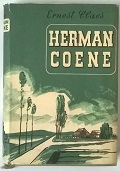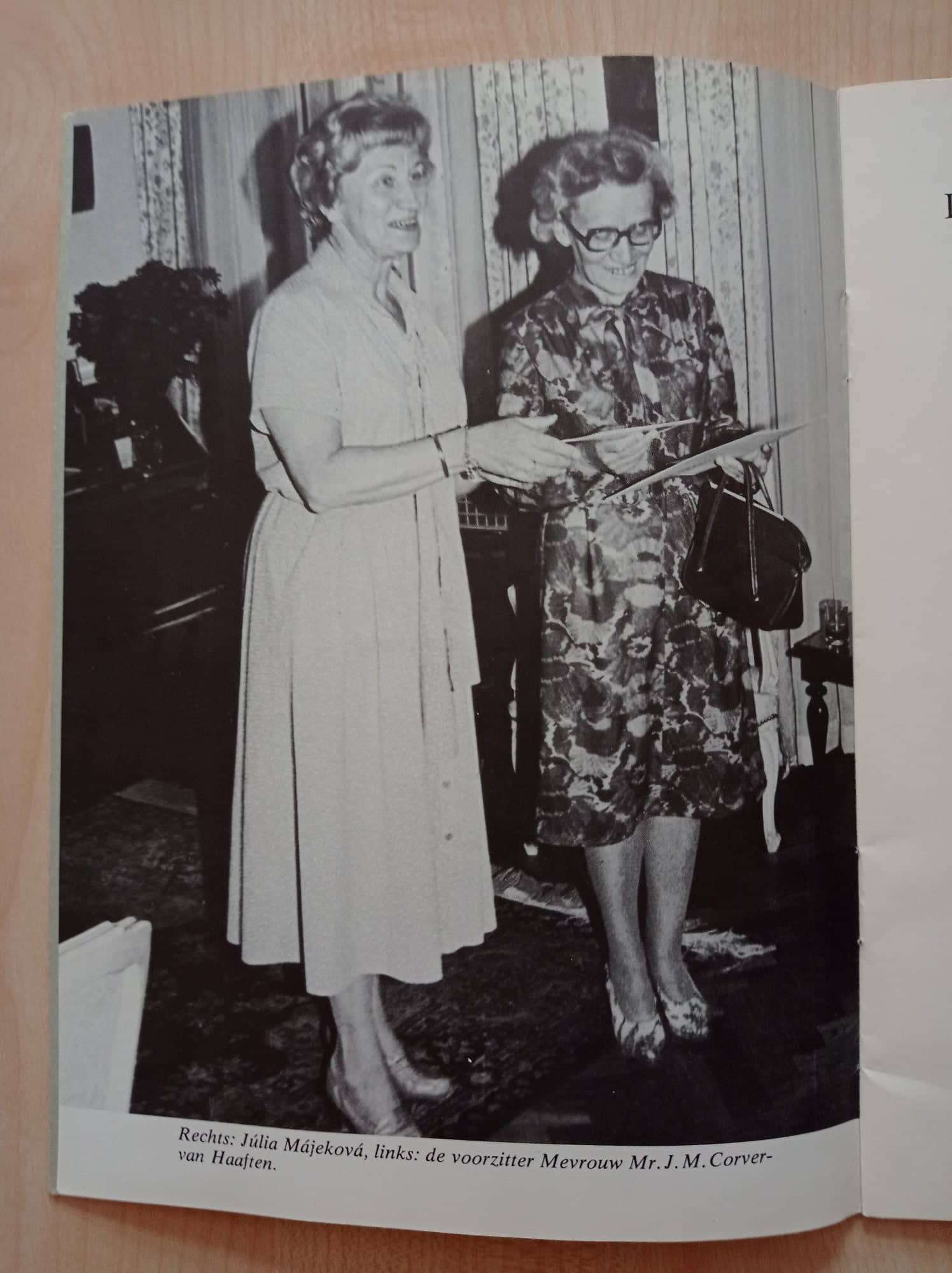Júlia Májeková

Júlia Májeková (27.12.1919, Vienna - 25.1.1991) studied at a grammar school in Ružomberok (until 1938) and then studied German and Slovak at the Faculty of Arts at Comenius University in Bratislava. In 1939, with the founding of the fascist Slovak Republic (led by Jozef Tiso, until 1944), this university changed its name to the Slovak University and several Czech professors were dismissed. However, Professor of German and English František Kalda (the founder of Czechoslovak Low Countries Studies at Charles University in Prague) was allowed to continue teaching, probably because there were not enough teachers in this field. Professor Kalda also taught comparative Germanic linguistics and offered Dutch as part of these classes. Júlia Májeková also followed this course as a student of Kalda. According to Májeková (see Kerlík 1977: 177), she was interested in Dutch because she wanted to supplement her basic knowledge of historical grammar of the Germanic languages and her philological courses in Gothic, Old and Middle High German with a course in Dutch from a comparative point of view. So initially she was interested in Dutch as a Germanic language. Only later did she also become acquainted with the literature and culture of the country.
In the academic year 1942-43 she was able to study at the University of Leipzig with a scholarship, but it is not clear whether she had contacts with Dutchmen there, perhaps she only studied Germanic literature. She graduated from the Slovak University in 1944. After she had finished her studies, she could start a postgraduate study of Dutch language and literature at the Faculty of Arts and Dutch literature in Leiden in the academic year 1947-1948, and later she studied in the Netherlands (1964) and Belgium (1967).
Májeková herself expressed a desire to teach, and for a short time (two years) she was able to work as a teacher at the secondary trade academies in Martin and Poprad, but she soon began her career as a translator and editor at the Tatran publishing house (1949-1977), and after retirement she worked at Lúč publishing house as a language editor and proofreader.
Májeková made her debut as a translator in 1944 with a translation of the novel Herman Coene by the Flemish regional novelist Ernest Claes. In an interview (Kerlík 1977: 177) she said that during her studies she got an offer from Dr. Jozef Felix, who was the editor of the SPKK (Spoločnosť priateľov krásnych kníh, the Society of Friends of Fiction Books) to translate a certain Dutch novel. She later said that it was actually a Flemish novel. By the way, the novel itself was reviewed in several weekly and daily newspapers (see the links in the DLBT). Herman Coene is the first novel in Slovak that was not translated via an intermediary language (German and to a lesser extent French). This practice would still regularly occur during the communist period and in the case of children's literature, graphic novels and non-fiction even up to now.
Májeková had so much work with the translation of this novel that she did not take her final exams until two years later and could finally finish her studies with a postgraduate degree in Leiden. In the meantime, she had already been working for some time as an editor at Tatran publishing house.
Dr. Jozef Felix himself, who was a Romanist by training and who strongly contributed to the development of the subject of Romanistics in Slovakia, was known as a comparative literature scholar because in his time there was very little literature available in translation. He therefore realised the "need to intervene and coordinate translator activities respectively”. He thus wanted to systematically organise groups of translators for various languages (Žitný 2014: 225). The offer to provide the talented Májeková with a translation from Dutch can be seen in this perspective.
Translation specialisations and translation career
The work In Memoriam by Dvořáková-Žiaranová (1991) states that de facto Májeková was the only translator who translated from Dutch from 1944 to 1991, all other translations into Slovak from the period when she was active, were translated via an authorised intermediary language, either German, English or French. The total number of translations from Dutch by Májeková amounts to 28 titles (see also DLBT), supplemented by some radio plays. As far as Germanic literature is concerned, she has also translated Johann Goethe, Stefan Zweig, Thomas Mann, among others, and a total of 19 German works. Májeková also translated two interesting works with German as an intermediary language: a collection of Serbian folk tales Smolný Peter (1975) and the novel Salka Valka (1980, original from 1931) by the Icelandic author and 1955 Nobel Prize winner Halldór Kiljan Laxness, because there were no Icelandic translators available in Slovak. As for her translations from Dutch and German, the first four translations were from Dutch-language, in the 1950s and 1960s mainly German-language and then in the 1960s, 1970s and 1980s mainly Dutch-language.
Májeková's translation canon and views can be partly reconstructed from the interview with Peter Kerlík in Revue svetovej literatúry (1977) and earlier in a 1969 mini-interview in the daily newspaper Práca. In addition, it is also interesting to examine the authors she includes in her overview of Dutch literature in the review Dejiny svetovej literatúry (History of World Literature), because it is textbook example of (in this case communist/socialist) ideology influencing the literary history and canon in translation. Note, for instance, that author Theun de Vries gets a full page of attention in her review, as does the communist author Maurits Dekker.
In an interview with Emilia Nemsilová in Práca on the occasion of her 50th birthday (1969), she asks which works the Slovak public should definitely get to know. Májeková replied that apart from the works of Multatuli, Theun de Vries, Timmermans, Wolkers, Mulisch and Vestdijk (which she had already translated up to that point or would translate in Wolkers' case), something from the Golden Age should definitely be translated, such as P.C. Hooft, Vondel or Bredero. She also mentioned the nineteenth-century authors Bilderdijk, Da Costa, Potgieter and Guido Gezelle; of the twentieth-century novels, she mentioned Streuvels, Couperus, the verses of Gorter and Roland Holst and the cultural-historical works of Huizinga. Among the most recent authors, she mentions Filip de Pillecijn, Elsschot, J. Heine, Hubert Lampo, Marnix Gijsen, Hugo Claus, den Doolaard, W.F. Hermans and Ward Ruyslinck. Elsschot, Hermans and Huizinga were meanwhile translated, and Huizinga even broadly framed by her successor Adam Bžoch; later in her career after 1969, Májeková would translate Couperus, Lampo, Claus, den Doolaard and Ruyslinck.
Doležáleková (2006) uses translation theory models (Popovič, Hrdlička, Hochel and others) to examine Májeková's translation strategy based on her translation of the novel Max Havelaar (translated in 1963). This novel was chosen by Doležáleková as a case study because of its challenging cultural realia, not easy to consult in the countries behind the iron curtain at a time when there was a lack of corpora and dictionaries to consult meanings. As for her translation strategy, the jury report from 1978 (online) that decided to award her with the prestigious Martinus Nijhoff Award also offers some more information. The jury's assessment (a Czechoslovak and a Dutch expert were the assessors) was again based on a work by Multatuli, Woutertje Pieterse and her translation of Mulisch's Het stenen bruidsbed. The reports particularly praised the meticulousness of the translations. In the words of the jury:
"This meticulousness is never at the expense of the expressive possibilities of Slovak; on the other hand, Mrs. Májeková never tries to "Slovakize" frenetically, preferring to resort to an annotation in an appendix rather than to gloss over an untranslatable pun or nuance. Her familiarity with Dutch realia is as much praised as her clear insight into ideological finer points, so that she is seldom in doubt about the stylistic and social level of the prose used." (Nijhoff Award jury report, 1978: online)
Translation awards – other publications

Júlia Májeková in 1978 at the handing over ceremony of the Martinus Nijhoff Translation Award. Mrs. Corver-van Haaften was the president of the Prince Bernhard Fund.
Májeková's choice of translated works places her among the most prominent Slovak translators (Žitný 2017). It was not long before this was also noticed nationally and internationally, and in 1978 she was awarded the prestigious Martinus Nijhoff Translation Award financed by the Prince Bernhard Fund. As it was not possible to get exit visa for Netherlands, she accepted the prize at the Dutch embassy in Prague. Both her acknowledgement and the jury report can be found on the website of the Prince Bernhard Fund. (online)
She also won prizes in the Netherlands. She was laureate of the Ján Hollý Translation Award in 1974, won for her translation of De gods gaan naar huis by A. den Doolaard (Bohovia sa vracajú). However, the Nijhoff Award jury report stated that the prize could also be considered an oeuvre prize because of her outstanding use of Slovak. It is true that the prize is usually awarded to a translator only once in his or her career.
In addition to her translated novels, Májeková also compiled the chapter on Dutch literature, Flemish literature and African literature in the volume of Dejiny svetovej literatúry (History of World Literature, 1963) and the entries on various Dutch and Flemish writers in the Malá encyklopédia spisovateľov sveta (Small Encyclopaedia of World Writers) in 1978.
(Benjamin Bossaert)
References
Dvořákova-Žiaranová, Ružena (1991). Za Júliou Májekovou (in memoriam). In: Literárny týždenník, 4.6., p.2
Doležáleková, Lucia (2006). Júlia Májeková. Život, dielo a prekladateľská koncepcia. Unpublished graduation thesis. Bratislava: Filozofická fakulta Univerzity Komenského v Bratislave.
Juríček, Ján (ed.) et al. (1978) Malá encyklopédia spisovateľov sveta. Košice: Obzor
Kerlik, Peter (1977). Náš hosť Júlia Májeková. In: Revue svetovej literatúry, ročník 13, 1977, nr. 2, p. 177-179.
Májeková, Júlia (2017) (author of lemma: Milan Žitný) In: Oľga Kovačičová, Mária Kusá (eds.), Slovník slovenských prekladateľov umeleckej literatúry 20. Storočie. Bratislava: VEDA, vyd. SAV.
Martinus Nijhoffprijs. Laureaten. Juryrapporten. Dankwoorden. Online. https://www.cultuurfonds.nl/martinus-nijhoff-vertaalprijs/juryrapporten-dankwoorden
Nemsilová, Emilia (1969). Na slovíčko s Júliou Májekovou. Problémy prekladania. In: Práca, Bratislava, 29 dec. 1969.
Pišút, Milan (ed.) et al. (1963) Dejiny svetovej literatúry. Martin: Osveta
Wikipedia-lemma about Júlia Májeková https://sk.wikipedia.org/wiki/J%C3%BAlia_M%C3%A1jekov%C3%A1
Žitný, Milan. K miestu nemeckých a severských autorov v literárnokritickej tvorbe Jozefa Felixa v rokoch 1939 až 1944. In: Truhlářová, Jana (ed.) Jozef Felix (1913-1977) a cesta k modernej slovenskej romanistike. Bratislava: VEDA (SAV). p. 224-250.
